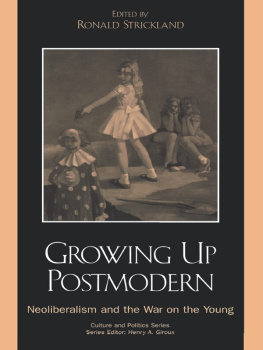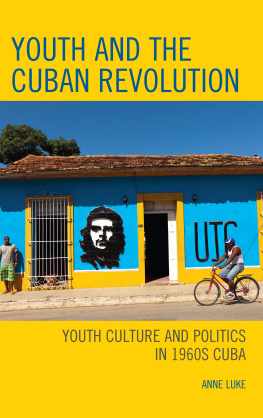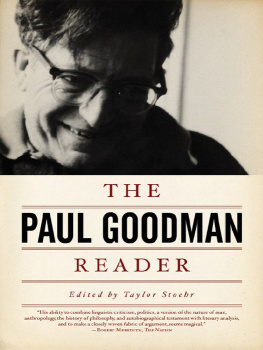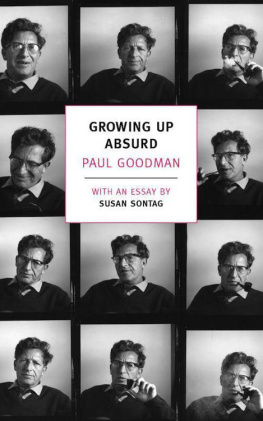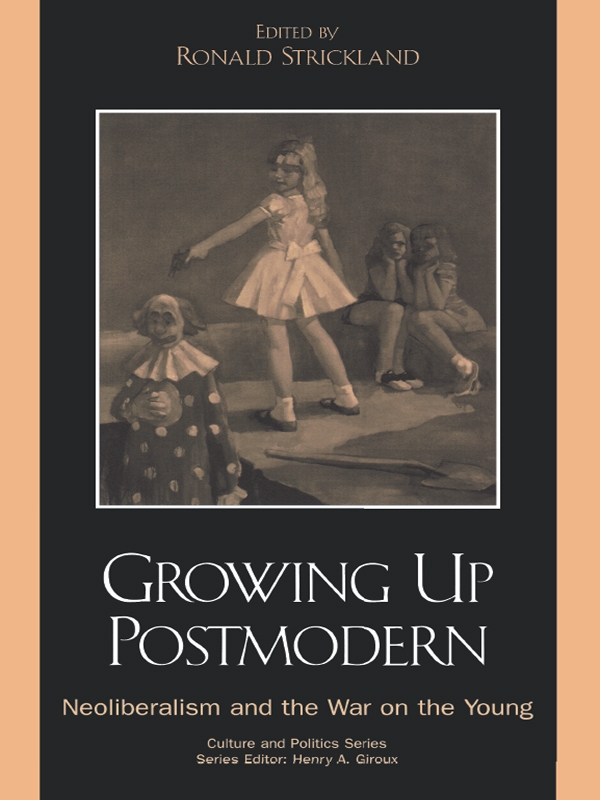Some of the essays included in this collection were first delivered as papers at Border Subjects IV: Growing Up Postmodern, a conference held at Illinois State University in October 1999. I would like to express my gratitude to the Provosts Office, the College of Fine Arts, the University Galleries, Global Review, the Minority Professional Opportunities Program, and the departments of English, Foreign Languages, Philosophy, and Curriculum and Instruction for their financial and institutional support, and to my colleagues Sophia McClennen and Victoria Harris for their help in organizing the conference.
About the Contributors
Jennifer Drake holds degrees from Brown University and the State University of New York at Binghamton. Currently, she is an assistant professor of English and womens studies at Indiana State University. She is co-editor of Third Wave Agenda: Being Feminist, Doing Feminism , and has written published or forthcoming essays on the work of Anna Deavere Smith, Guillermo Gmez-Pea, Coco Fusco, Bharati Mukherjee, Edwin Torres, Adrian Piper, and Lorna Simpson.
Henry A. Giroux is the Waterbury Chair Professor of Education and Cultural Studies at Penn State University. His latest book is Breaking in to the Movies: Film and the Culture of Politics .
Margaret Henderson teaches in the Bachelor of Contemporary Studies Program at the University of Queenslands Ipswich campus. She is currently writing a book on the remembrance of the Australian womens movement. Most importantly, she has surfed for ten years and only rides short boards.
Angela E. Hubler is an associate professor of womens studies at Kansas State University. Her research and publications focus on the literature and culture of female adolescence. You can email her at lela@ksu.edu.
David M. Jones is an assistant professor of English at the University of Wisconsin at Eau Claire. His scholarly interests include African American nonfiction and romance texts, themes of protest in American literature, and black feminist thought. He is also interested in critical theory on masculinity, whiteness, literature, and performance.
Elizabeth Kleinfeld teaches composition, literature, and humanities at Red Rocks Community College in a suburb of Denver. She is working on a Ph.D. in English studies at Illinois State University.
Andrew Kurtz teaches literature and popular culture at Bowling Green State University Fire-lands College. He is currently working on a critical analysis of addiction discourse as deployed by players of massively multiplayer role playing games.
Bill Osgerby is a senior lecturer in cultural studies at the University of North London. His publications include Youth in Britain since 1945, Playboys in Paradise: Masculinity, Youth, and Leisure-Style in Modern America , and a co-edited anthology, Action TV: Tough-Guys, Smooth Operators , and Foxy Chicks .
Jerry Phillips is an associate professor of English, Latin American and Caribbean studies at the University of Connecticut. He has published articles on Christopher Columbus, Herman Melville, Matthew Arnold, and Thorstein Veblen. He was the recipient of the Childrens Literature Association Award for the Best Critical Essay of 1993.
Timothy Scheie has published numerous articles on French and American theater, and on the work of Roland Barthes. He teaches French, theater, and film at the University of Rochesters Eastman School of Music.
Gary L. Smith is a freelance journalist who lives in central Illinois and has written frequently about juvenile court cases. His article grew out of research for a book-in-progress on the twentieth-century management of marginalized children.
Ronald Strickland is a professor of English at Illinois State University. He co-edited After Political Correctness: The Humanities and Society in the 1990s , and he is currently working on a book about teaching the humanities in the corporate university.
Astra Taylor received her M.A. in liberal studies from the graduate faculty of the New School For Social Research and resides in Brooklyn, New York. Her writing has also appeared in The Politics of Community , edited by Michael Strysick. She is a part-time faculty member in sociology at the University of Georgia.
Introduction: Whats Left of Modernity?
Ronald Strickland
Growing Up Postmodern takes its inspiration from Paul Goodmans Growing Up Absurd , an indictment of postwar American societys failure to provide the necessary conditions for boys to grow up into an emotionally healthy and dignified adulthood. Writing at the end of the 1950s, hard upon the emergence of both the youth culture and the socioeconomic and cultural conditions that we now identify as postmodernity, Goodman saw modern American society as suffering from a long list of compromised revolutions. In Growing Up Absurd he called for a revival of progressive efforts in areas such as urban planning, social welfare, workplace democracy, freedom of speech, racial harmony, sexual freedom, popular culture, and public education to produce a society that could inspire young people, an adult society worth joining.
In many ways the problems Goodman identifies are still with us today. He describes a postwar American society that was unwilling to fund adequate public education, and unable to provide meaningful and dignified employment for most of its citizens. At the turn of the century, despite the pro-education rhetoric of recent political campaigns, public education is still suffering after more than two decades of systemic underfunding from the 1970s into the 1990s. And during the high employment boom years of the 1990s the largest growth was in low-paying, dead-end service-sector jobs. Goodman describes a postwar society that was alarmed by youth violence and responded with increasingly punitive treatment of young offenders while the root causes of youth disaffection and hopelessness were ignored. In the last two decades, even as public education funding has stagnated, budgets for new prison construction are exploding and children barely in their teens are being held responsible as adults for criminal behavior. Goodman describes a postwar society in which young people have a little extra spending money, so they get around more and are exposed to the expensive glamour, but this is precisely not attainable by them unless they take short cuts. At the end of the twentieth century the youth marketing industry that Goodman observed in its infancy has long since come of age. Contemporary youth are prematurely affluentthey have money for consumer electronics, fashion apparel, movies, and music cds, but they linger in dependence upon their parents assistance for basic living expenses, educational costs, etc. According to economic forecasts, many of them will not attain the level of economic security achieved by their parents.
These chronic problems of modernity have become the accepted status quo of postmodernity; to many people they now appear no longer as problems but as the natural and unchangeable order of things. Indeed, for some contemporary cultural critics postmodernity is a revolutionary new social order in which the political projects and goals of the enlightenmentdemocratic political empowerment, progressive social policy, high-quality public education, etc.have been rendered obsolete. In the consumerist theory of Jean Baudrillard, for example, the freedom to consume has replaced political freedom. In postmodern society, according to Baudrillard, subjectivity is formed and expressed through consumption. Postmodern consumption exceeds the fulfillment of need, expressing the subjects desire at the level of the political economy of the sign, which is taken to supercede the societys economic relations of production. The corporate-political strategies of neoliberalism have been gaining prominence since the economic downturn of the early 1970s. Under expanded free-trade agreements industrial production has been displaced from rust belt U.S. cities to the maquiladora region of northern Mexico and other underdeveloped locations where cheap labor, weak or nonexistent environmental protection regulations and undemocratic governments enable greater corporate profits and leverage for corporations to squeeze further concessions from U.S. workers.

